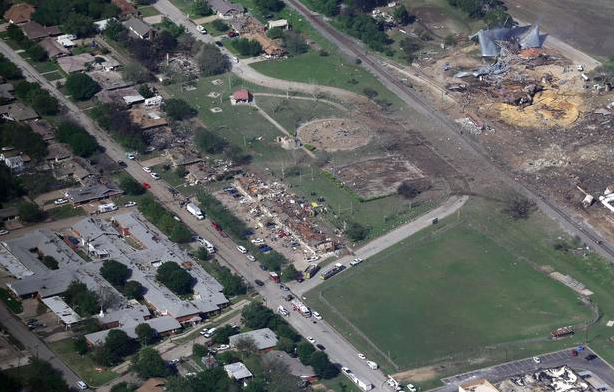Today marks the fifth year anniversary of the West Fertilizer Company plant explosion, and more preventable disasters could happen because of EPA inaction.
On April 17, 2013, a spontaneous combustion of ammonium nitrate led to several explosions that killed 15, injured 180, and caused destruction to surrounding areas, including a middle school, nursing home, apartment complex, and dozens of homes in the town of West. First responders and plant personnel were among those killed.

Aerial photo of the West, TX explosion on April 17, 2013 (Photo: Tony Gutierrez/AP)
However, the Environmental Protection Agency continues to delay the Chemical Disaster Safety rule, created by the EPA in 2016 to improve safety regulations on chemical facilities to prevent deaths, injuries, and hazardous pollution exposure and protect residents, workers, and first-response providers.
Under industry pressure, Trump’s EPA has put off the rule until February 2019 while it looks for ways to roll back these protections.
Last month, oral arguments were heard in the U.S. Court of Appeals for the D.C. Circuit in a case against a 20-month delay, filed by Earthjustice, representing 15 environmental and labor groups including the Sierra Club. But harmful chemical accidents continue to occur, and EPA’s own data shows there could be at least 300 more accidents involving dangerous chemicals during this nearly two year delay.
DC judges are expected to issue a ruling on the EarthJustice litigation this spring.
Seven months ago, residents of Crosby, Texas, a small city northeast of Houston with around the same population as West (less than 3,000 people), were exposed to toxic fumes when highly reactive chemicals at the Arkema, Inc. chemical manufacturing plant caught fire during flooding caused by Hurricane Harvey (Arkema is currently being sued by two counties, dozens of first responders and hundreds of Crosby residents for negligence.) Arkema officials ended up simply allowing the dangerous combustible chemicals (organic peroxides) to ignite and explode, as it was too dangerous to enter the flooded plant site. Loss of power and cooling for these chemicals occurred due to inadequate flood protection and other preventable measures.
“These are not isolated incidents in a state notorious for lax fossil fuel industry regulations and home to the world’s largest petrochemical complex. Texas ranks number 1 in the nation, with 2,113 facilities or 17 percent, that are handling dangerous chemicals subject to the EPA’s new Chemical Safety rules,” said Lone Star Chapter Clean Air Director Neil Carman.
“I used to inspect refineries and chemical plants in Texas and witnessed fires occur at major industrial plants first hand. Texas has large populations living in fence line and downwind communities where toxic air pollution drifts for miles such as into the City of Houston from the Houston Ship Channel industry. Each day the Chemical Safety Rule is delayed, and with the increased frequency and severity of extreme weather disasters, these communities are more and more at risk from fires, explosions and toxic release.”
Deadly plumes could occur from 1,3-butadiene, chlorine, hydrogen fluoride, hydrogen sulfide, ethylene oxide, and other dangerous chemicals in routine use in dozens of Houston and Gulf Coast plants. A deadly vapor cloud of one or more specific chemicals are projected in the Risk Management Plans, and, in certain cases, the radius of lethal exposure to the public can extend out to 20-25 miles from plants. Catastrophic failures of storage tanks, process vessels, piping, and other plant areas are possible without better chemical safety rules.
One example of a safer alternative is to require oil refineries to switch from using the deadly alkylation catalyst hydrogen fluoride to a non-toxic catalyst. Fourteen refineries in Texas currently use hydrogen fluoride, with Valero having the most at five. Hydrogen fluoride is a Bhopal-like chemical that could kill thousands from a catastrophic storage tank breech. Several Texas refineries have experienced serious accidents in which deadly hydrogen fluoride plumes were released in Texas City and Corpus Christi. Texas refinery communities would be much safer if refineries adopted safer alkylation chemicals.